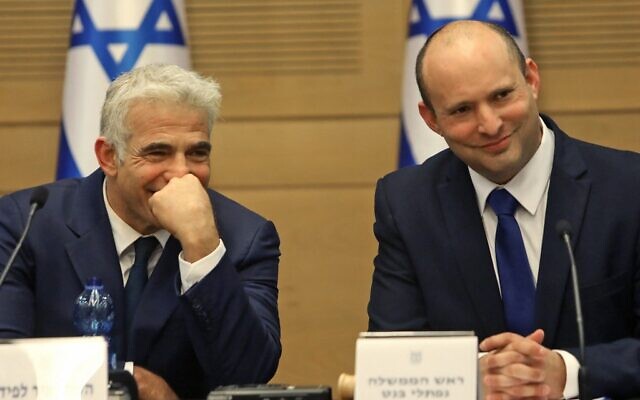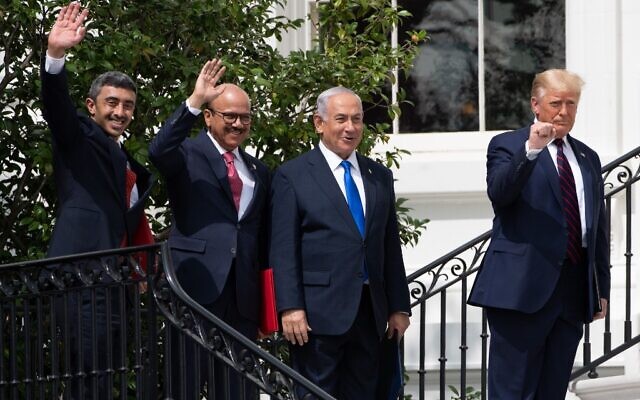In Rome, new foreign minister tells US counterpart that Jerusalem has ‘serious reservations’ about Iran nuclear deal, but promises to express them quietly

Bipartisan support for Israel in the United States was harmed during the Benjamin Netanyahu years, Foreign Minister Yair Lapid told US Secretary of State Antony Blinken in Rome on Sunday.
“In the past few years, mistakes were made,” Lapid said in a statement before their meeting. “Israel’s bipartisan standing was hurt. We will fix those mistakes together.”
Speaking at the opening of their first meeting since he became foreign minister, Lapid said he had spoken with Democratic and Republican leaders over the past few days.
“I reminded them all that Israel shares America’s most basic values — freedom, democracy, free markets, the constant search for peace.”
Lapid also stressed that Israel has “some serious reservations” about the Iran nuclear deal being negotiated in Vienna.
“We believe the way to discuss those disagreements is through direct and professional conversations, not in press conferences,” the new foreign minister said.

Like the previous government, the new one led by Bennett and Lapid is strongly opposed to the Biden administration’s efforts to re-enter the Iran nuclear deal, known as the Joint Comprehensive Plan of Action (JCPOA). However, Lapid — and reportedly Bennett as well — have stressed that whatever their disagreements with the US, they plan to address them behind closed doors, rather than through public skirmishes the way Netanyahu did during the Obama administration.

According to Lapid, the two sides would discuss “a range of issues which concern Israel, including strengthening our ability to defend ourselves, working to minimize conflict between us and the Palestinians, while making life better for Israelis and Palestinians alike.”
Blinken opened his statement by emphasizing that the US-Israel relationship is based on “shared values and shared interests.”
Turning to Iran, Blinken said: “We have the same objectives, but sometimes we differ on the tactics, and I think we are very clear and direct with each other when that is the case, and that is exactly the way it’s supposed to be.”
The secretary of state said the countries would work together to “offer a more hopeful future for everyone, Palestinians and Israelis alike, with equal measures of opportunity and dignity.”
Blinken underscored American support for expanding the Abraham Accords that saw Israel normalize ties with several Arab countries, but added the caveat that they are not a substitute for resolving the Israeli-Palestinian conflict.
Lapid also expressed his condolences to the victims of the building collapse in Miami.
Lapid later met with Bahrain’s Foreign Minister Abdullatif al-Zayani after his discussion with Blinken, marking the first meeting between the new Israeli government and a cabinet minister from the Gulf countries.
“Peace with Bahrain should be an example of the right kind of process that needs to happen in our region,” Lapid tweeted after the meeting. “We also spoke about the challenges facing the Middle East, first and foremost Iran.”
The meeting with Zayani came ahead of Lapid’s Tuesday trip to the Gulf region, where he will attend the inauguration of the new Israeli embassy in Abu Dhabi and consulate in Dubai.
Israel, the Emirates, and Bahrain signed a formal peace and normalization agreement between them last year. Lapid’s trip will be the first for a senior Israeli minister to the Gulf in the wake of that agreement.
Lapid also met with Italian Foreign Minister Luigi Di Maio.
The Blinken meeting follows two phone calls the top diplomats held earlier this month as Washington intensified its contacts with the new government in Israel, which was sworn in on June 13. In the first call, Blinken congratulated Lapid on forming a coalition headed by Prime Minister Naftali Bennett.

The second call was more substantive, with the two discussing “the opportunities and ongoing challenges for Israel and the region,” according to the State Department.
“The secretary discussed the US commitment to Israel’s security, the importance of the US-Israel bilateral relationship, and the need to improve Israeli-Palestinian relations in practical ways,” the statement said then.
According to a statement from Israel’s Foreign Ministry, “the two talked at length about a wide range of strategic issues including the security and political situation in the region.”
As reported by The Times of Israel
